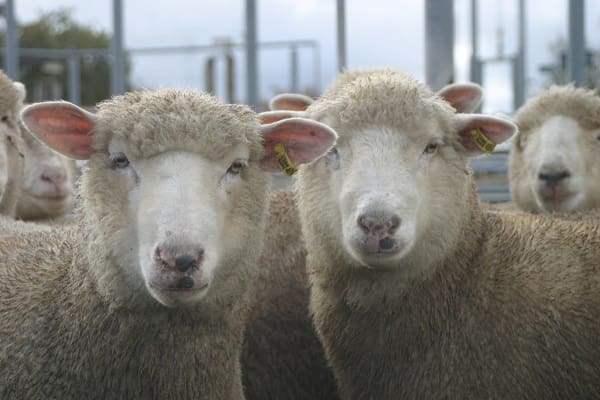
Lambs with electronic ear tags.
NEW South Wales sheep producers, saleyards, processors and stock agents will have their electronic identification system costs subsidised in a rebate scheme announced by the Albanese and Minns governments today.
At the NSW Farmers conference today, NSW Minister for Agriculture, Regional NSW and Western NSW, Tara Moriarty, announced the governments would contribute more than $38 million to implement mandatory sheep and goat electronic identification across the state.
From 1 August 2023, the sheep and farmed goat supply chain will be able to access an NSW Sheep and Goat EID Infrastructure Rebate to assist impacted stakeholders in transitioning from the existing visual tag system to an EID one.
The rebate will first be rolled out to saleyards and processors, then producers and agents from 3 October 2023.
The New South Wales government is contributing $31.4 million toward the scheme, with the Federal Government chipping in $7.2 million.
The funding was appreciated by NSW Farmers, however; the association’s Sheepmeat Committee chair Jenny Bradley said there had to be a greater contribution from the Federal Government, and the details had to be closely examined.
A spokesperson for Minister for Agriculture Fisheries and Forestry Murray Watt said further announcements of funding in other states could be expected.
“The Albanese Government committed $46.7 million for strengthening livestock traceability in the October Budget.
“This funding included $20.1 million for special purpose payments for co-investment with states and territories to support industry traceability improvements,” the spokesperson said
“The figure quoted today is the direct NSW allocation of the $20.1 million.”
Mrs Bradley said NSW Farmers expected that all producers who are required to invest in mandatory EID should be able to readily access this funding and receive a rebate so that no one misses out.
“The government’s EID rollout is a significant issue for producers, and we welcome progress; however, there still remains a significant need to reduce the cost of EID NLIS devices to economically affordable levels.
“If some states have cheaper tags than others, producers will lose faith in the fairness of the system, and we won’t stand a chance of national harmonisation,” she said.
“The funding was not expected to reduce tag costs in NSW, and Mrs Bradley said this was a critical issue that needed to be addressed. She said there had to be funding from the federal government to bring down the cost of EID tags.
 “NSW Farmers policy seeks EID tags for sheep cost no more than $1 per tag, and more affordable tags is a position broadly agreed to by all other state farming organisations at our meeting in Adelaide last week,” Mrs Bradley said.
“NSW Farmers policy seeks EID tags for sheep cost no more than $1 per tag, and more affordable tags is a position broadly agreed to by all other state farming organisations at our meeting in Adelaide last week,” Mrs Bradley said.
“We know tags need to be more affordable and we need flexibility with the NLIS when much lower cost devices become available.
“But the clock is running on the rollout of mandatory EID – sheep and farmed goat producers can’t afford to keep waiting for solutions to this issue of tag costs – we call on the NSW and Australian Governments to initiate a national tag tender to support the reduction of NLIS EID device costs; we need prompt action to initiate a scheme.”
Mr Watt said bringing in an EID system has very strong advantages for our farmers.
“When we can tell the story of every animal and prove to our consumers the integrity of our supply chains, we can reassure our trading partners that our products are being produced to the highest possible standards of quality and animal welfare.
“We have a great story to tell of our high-quality produce, and this opens up possibilities for accessing premium markets overseas,” Mr Watt said.
“We know that our produce is sustainable and subject to rigorous standards. With the data and transparency to back it up, the rest of the world will know it as well.”
Ms Moriarty said the funding demonstrates the NSW Government’s commitment to enhancing traceability systems and supporting the industry to meet this objective.
“Better traceability will ensure we can respond faster if there is an outbreak of an emergency animal disease and therefore reduce potential impacts on animals, farmers and consumers worldwide.
“We’ve heard industry – they need support to make the move to EID,” she said.
“Industry has been involved every step of the way through the NSW Sheep and Goat Traceability Reference group, with additional feedback obtained via direct engagement from stakeholders across the sheep and goat supply chain.”
The rebate scheme will be administered by the NSW Rural Assistance Authority (RAA) and will include:
- 100 percent rebate to saleyards (due to high upfront costs)
- 50pc rebate to processors
- 50pc rebate to stock and station agents
- 50pc rebate to producers
The NSW Government will provide additional free EID-specific training and education to help producers, agents and those working in saleyards and processors to understand their requirements with respect to sheep and goat EID.
Training is expected to commence later this year.
Ms Moriarty encouraged all possible applicants to visit the RAA website for more information about what support is available to them.
For more information on the implementation of EID for sheep and goats in NSW visit www.dpi.nsw.gov.au/eid and sign up to the NSW sheep and goat eID newsletter.

HAVE YOUR SAY